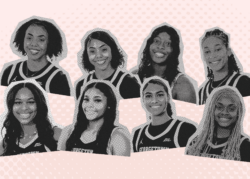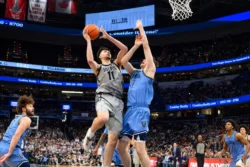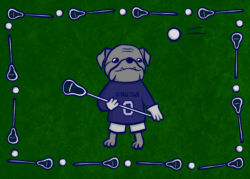Six-foot-five swingman Martez Walker, considered a top 10 prospect in his grade, bought himself some peace of mind earlier this year when he orally committed to play for the University of Louisville. Standing in Walker’s shoes a little over a year ago Taylor King made a similar decision. The six-foot-six top 25 prospect who wowed basketball camp crowds from coast to coast orally committed to UCLA.
Now with all that pesky college business out of the way they can focus on other things-like starting high school.
Birmingham’s Central Park High School freshman Walker gave his verbal ‘okay’ to play for Rick Pitino’s Cardinals at 15 years old. King, now a Mater Dei High School sophomore, agreed to play for the Bruins before he even played a single high school game.
Normally, colleges want to see players develop in high school before they risk offering a scholarship slot, but with competition for high school prospects becoming so cutthroat, colleges can’t risk letting their rivals beat them to the punch. So what you have is all these early birds and not enough worms to go around. That’s why scoping out a player barely out of junior high is becoming so much more alluring.
Players can’t make anything official until their senior year because the NCAA does not recognize oral commitments. It’s more like a bidding war than a set commitment. Getting a verbal commitment only lets everyone else know who they have to beat. So why do colleges even bother? Because to compete with each other and the lure of a cushy guaranteed NBA contract, they have to start forming relationships as early as possible.
This might benefit basketball all around. For the NCAA, colleges get a chance to snag players early, which gives them a better chance of getting them to choose college over the NBA. Most high schoolers spend their first couple of years in college riding the bench. Even Kobe Bryant had to simmer on an NBA bench before he had a chance to really shine. Players hooked early are inclined to develop at the college level, which would produce higher quality rookies and free up roster space for NBA vets who’ve already paid their dues. It will also keep players from making the jump to the NBA erroneously. Sure, Lebron James would’ve been wasting his time bothering with the NCAA. But for every LeBron there’s a DeAngelo Collins, Giedrius Rinkevicius or Lenny Cooke. Never heard of them? Exactly.
Deciding on a college early relieves players of a huge burden, which lets them worry about the other aspects of high school. Oral commitments are firm enough to provide players some security but loose enough to allow them to weigh their options once the time comes to make it all official. The players benefit most of all.
The question is not wihether this trend will accelerate, but how fast. How soon will college coaches be pitching their case to prospects just out of Pampers? Will the day come when scouts will be saying “we’ve seen the ultrasounds and I gotta tell ya he’ll make an excellent addition to our backcourt.”
Obviously, it’ll never get that ridiculous. But just in case, I formally commit my first-born son to the Georgetown class of 2040. The kid is already working on a sick crossover, trust me.





